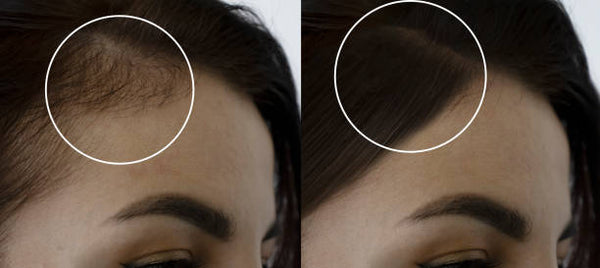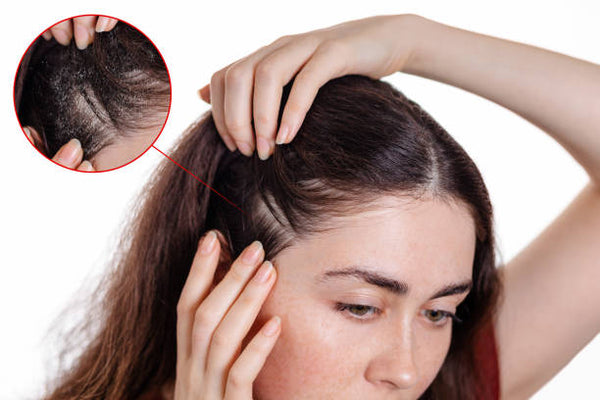Nutritional Needs for Healthy Hair During Pregnancy and Postpartum

During pregnancy, your body requires additional nutrients to support both the growing baby and your own health. The nutritional needs during this period are vital not only for general health but also for promoting strong and healthy hair growth.

1. Increased Iron Needs
Iron is essential for healthy hair growth, as it helps carry oxygen to hair follicles, promoting stronger and healthier hair. During pregnancy, iron levels often decrease due to increased blood volume, which can lead to hair thinning. It's important to consume iron-rich foods such as leafy greens, lentils, beans, and lean meats, or consider supplements as recommended by your healthcare provider.
2. Protein for Hair Strength
Hair is primarily made of protein (keratin), and adequate protein intake is essential for hair growth. During pregnancy, your body needs more protein to support the growth of the fetus and the placenta, as well as your own bodily functions. Including protein-rich foods like eggs, fish, poultry, beans, and nuts in your diet can help ensure healthy hair.
3. Omega-3 Fatty Acids for Scalp Health
Omega-3 fatty acids are important for maintaining a healthy scalp and promoting hair growth. These healthy fats help to nourish the hair follicles, reduce inflammation, and support overall hair health. You can get omega-3s from foods like salmon, chia seeds, flaxseeds, and walnuts.
4. Vitamin D for Hair Follicle Regulation
Vitamin D plays a key role in the hair growth cycle by helping regulate hair follicles. During pregnancy, vitamin D deficiencies can contribute to hair thinning or shedding. To ensure sufficient levels, it is beneficial to get some sunlight and include vitamin D-rich foods like fortified milk, egg yolks, and fatty fish in your diet.
5. Folic Acid for Hair Health
Folic acid is critical during pregnancy as it supports cell growth and regeneration. This vitamin helps in the development of healthy hair and prevents hair loss. Foods rich in folic acid include spinach, citrus fruits, beans, and fortified cereals. Folic acid also reduces the risk of neural tube defects in the baby and is a key component of prenatal vitamins.
Postpartum Nutrition and Hair Recovery
After giving birth, many women experience hair shedding, often due to hormonal fluctuations and the physical and emotional stress of caring for a newborn. Fortunately, good nutrition during the postpartum period can help promote hair regrowth and restore hair health.
1. Zinc for Hair Growth and Repair
Zinc is a crucial mineral for maintaining healthy hair follicles and promoting hair regrowth. During pregnancy, zinc requirements increase, and a deficiency can lead to hair thinning or shedding after childbirth. Foods such as pumpkin seeds, oysters, chickpeas, and nuts are rich in zinc and can help support hair recovery postpartum.
2. Biotin for Strengthening Hair
Biotin, a B-vitamin, is well-known for its ability to strengthen hair and prevent hair loss. It plays an essential role in keratin production, the protein that makes up your hair. Biotin deficiencies can lead to thinning and weakened hair. To ensure sufficient biotin levels, include foods like almonds, sweet potatoes, eggs, and avocados in your postpartum diet. Many prenatal vitamins also contain biotin to support hair health during and after pregnancy.
3. Vitamin C for Collagen Production
Vitamin C is important for collagen production, which supports the structural integrity of the hair and scalp. Collagen helps the scalp maintain its elasticity, which is crucial for hair growth. It also protects hair follicles from oxidative stress. Citrus fruits, strawberries, bell peppers, and broccoli are excellent sources of vitamin C.
4. Hydration for Healthy Hair
Staying hydrated is important not only for overall health but also for maintaining a healthy scalp and hair. Dehydration can cause dryness and brittleness, leading to hair breakage. Drinking plenty of water and consuming water-rich foods such as cucumbers, melons, and leafy greens will help maintain hydration levels and support hair growth.
5. Iodine for Thyroid Function
The thyroid gland plays an important role in hair health. Imbalances in thyroid hormone levels, particularly hypothyroidism, can contribute to hair thinning or loss. Iodine is essential for healthy thyroid function, so it is important to include iodine-rich foods such as seaweed, fish, and dairy in your diet.
How Nutritional Deficiencies Can Affect Postpartum Hair Health
Postpartum hair loss is a common experience, but the severity of the shedding can be influenced by nutritional deficiencies. Inadequate intake of essential vitamins and minerals can exacerbate hair thinning and delay recovery. Addressing these deficiencies with a well-balanced diet rich in the nutrients mentioned above can help speed up the regrowth process and ensure that your hair becomes thicker and healthier over time.
How Bond Repair Products Help During Pregnancy and Postpartum Hair Care
While nutrition plays a significant role in maintaining healthy hair during pregnancy and postpartum, external hair care treatments can also help prevent damage and support hair recovery.
1. Strengthening Hair Bonds
Bond repair products contain specialized ingredients that help to repair broken hair bonds, strengthening the hair structure and preventing further damage. These treatments are particularly helpful during postpartum hair shedding, as they can restore hair elasticity and resilience.
2. Restoring Hydration
Postpartum hair often becomes dry and brittle due to hormonal fluctuations. Bond repair products help to lock in moisture and restore hydration, making hair softer and more manageable.
3. Reducing Breakage
Bond repair treatments improve the overall strength of hair, reducing breakage during the regrowth phase. This can be particularly beneficial for women dealing with postpartum thinning, as it helps to maintain the integrity of newly growing hair.
Final Thoughts
Proper nutrition is key to maintaining healthy hair during pregnancy and the postpartum period. By focusing on essential nutrients such as iron, protein, biotin, omega-3s, and vitamins D and C, you can support hair health and reduce the risk of excessive shedding. Alongside a balanced diet, incorporating bond repair products can help to restore and strengthen hair, making it more resilient against breakage. By taking these steps, you can manage postpartum hair loss and enjoy a healthy, vibrant head of hair as you recover from childbirth.
FAQ
1. How long does postpartum hair loss last?
Postpartum hair loss typically lasts for around 6 to 12 months after childbirth. Once hormone levels stabilize, hair growth usually returns to normal.
2. Can I prevent postpartum hair loss?
While it is difficult to prevent postpartum hair loss entirely, maintaining a nutritious diet, managing stress, and using bond repair products can help mitigate excessive shedding and support hair regrowth.
3. Are there any specific supplements I should take for hair health postpartum?
Supplements containing biotin, zinc, and omega-3 fatty acids can help support hair growth. However, it's best to consult with your healthcare provider before starting any new supplement regimen.
4. Can my diet influence postpartum hair loss?
Yes, a nutrient-rich diet is crucial for managing postpartum hair loss. Ensuring adequate levels of iron, protein, zinc, and vitamins can help promote hair growth and reduce thinning.




